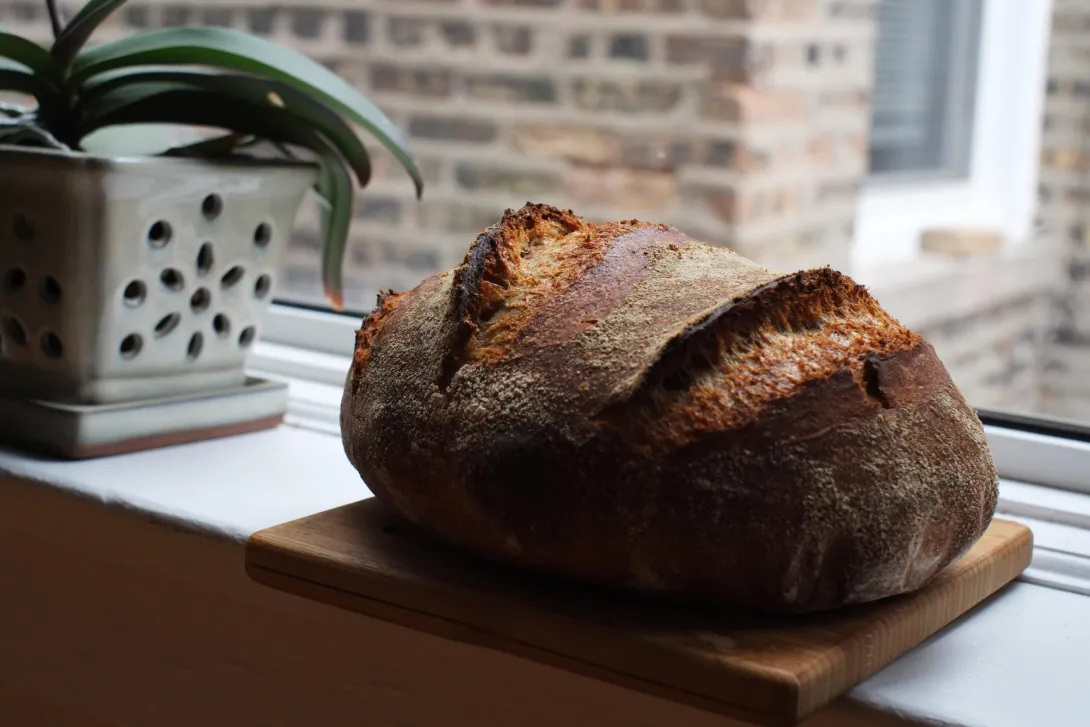
I've just made a breakthrough with my Tartine, home milled, 70% whole grain bread. It has 50% entire berry, whole wheat, 20% entire berry, whole rye, and 30% King Arthur white bread flour. 90% hydration.
- Benjamin Holland's Blog
- Log in or register to post comments
Do you have a pic of the crumb?
What sort of breakthrough did you have?
Cheers-
Dave
I wasn't sure how to add more than one pic to the blog post.
http://imgur.com/KT4sh23
I have never been able to get this kind of over spring with this much whole grain content. I have always used the basic Tartine book method of bulk fermenting at room temp and proofing in the fridge. But after some experimenting, I switched to bulk fermentation at room temp for a few hours while occasionally turning dough, then continuing bulk fermentation over night in the fridge; then shaping, bench resting, shaping; then proofing at room temp for 1.5 hours, then proofing in the fridge for 2.5 hours. Then baking. That, and I also arrived at adding my levain when it is at about double its initial volume, which is a bit older than I had initially used it.
Mixing the dough with the levain at 2X it's volume gave me my best looking loaf so far. Thank you so much Benjamin!!
- Giancarlo
Even since I mentioned that I have also increasingly seen the importance of tracking the exact levain rise. I now think that the other things I mentioned above (the exact fermentation schedule) is less important that the 2x levain (I actually now do between 1.75x-2x). I have done retarded bulk/room temp proof and vice versa, and as long as the levain rises appropriately, everything works out quite well.
Totally agree. Levain monitoring is something that is overlooked by most (all?) bread books I've read, but it's extremely important for consistency.
I did another experiment over the weekend to determine the time at which my levain reached peak height (about 3x) and found out I had been overshooting it by 3h (I use 20% starter to inoculate it). I baked a loaf using this levain and got an even better, much creamier crumb.
After baking both loaves I noticed something interesting. Fermenting a dough using the levain at 2x for 4h made my dough rise by 30%, whereas making the same recipe but with the levain at 3x gave me an 80% increase in volume after 4h. This could mean that a linear relationship exists between the volume increases of the levain and bulk fermentation (keeping the starter% and a set bulk fermentation time constant of course).
P.S. Handling that 30% risen dough was a magical experience. It was pillowy, light, and extremely extensible. Almost like the dough you see on Chad Robertson's Masterclass video.
Definitely something to try in the near future. Your loaf looks phenomental!
Great job :)
So many beautiful loaves lately! Well done!
Veyr well done indeed!
Happy whole grain bakling
Beautiful bread! What mill did you use? Any sifting?
Thanks.
Thanks! I use the Grainmaker. No sifting. I've dabbled with extraction, but really found that, for me at least, the whole grain really does deliver the best flavor. So this is whole, hard red winter wheat and whole rye, straight out of the mill. And as mentioned above, 30% of the flour is just store-bought white bread flour.
Very impressive. And sorry, but I've become rather interested in mills: Which model, the 99 or the 116? And with or without an electric motor?
Thanks again.
Feel free to ask me anything. mine is the model 99. The woman who answered the phone at the manufacturer told me there are few domestic situations where the larger one would be useful. I motorized it, but actually with a motor resold by Country Living. I liked their offering better because it had a gear box built right into the motor rather than requiring a big belt system to gear it down to a slow enough speed.
I still think it should be slower. If there were a way to set it up to just inch along at about .25 revolutions/second, I would do that. If you are milling a hard grain with a very fine setting (which is what I'm generally doing), the disks will get too hot pretty quickly. But it produces flour very quickly too.
My solution was to get a well timer. The timer turns the mill on for 4 minutes, then off for about 12, and repeats. That way I can just leave it running for several hours while I work and it produces a cool, fine flour.
I will put up a post about my milling soon.
Well timer: very clever indeed. Clearly your milling methods are important given the great oven spring you achieved with unsifted true whole wheat. I look forward to hearing full details about your milling when you have the chance.
Thanks again.